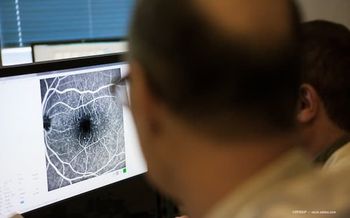
Urgent and emergent procedures decreased due to COVID-19. Is the change permanent?
Mark Breazzano, MD, discusses his research into the decrease in urgent and emergent procedures in ophthalmology, how he's handling it in his practice, and how to make patients more comfortable coming in to receive care.
How have you been handling the decrease in urgent and emergent procedures within your own practice?
Mark Breazzano, MD: Early on in the pandemic, I think there was a lot of fear for a lot of people, you know, wanting to come in and be seen, but at the same time, they didn't want to get infected with COVID, which is somewhat understandable. And especially for patients, particularly with age-related macular degeneration, for example. Genetically, they have a high risk of predisposition to getting that disease and losing vision.
And what's interesting is, as immunologically genetically based disease, basically, the complement factor system that is known to influence age-related macular degeneration, they are actually found to have a higher risk of having severe complications from COVID-19 infection.
And so in some ways, it was actually a reasonable fear for a lot of these patients, because, you know, we obviously don't want them to go blind from their disease, but at the same time, getting contracted with COVID-19, controlling for age and sex and all these other factors, they're actually at higher risk of having serious complications from COVID infection.
So the fear is real, I think, for these patients and somewhat substantiated, but at the same time, we need to make sure that we are…we're making ourselves available for our patients and making sure they don't lose vision, but also doing it safely.
Based on your research, do you think we can we expect a rebound in patient care?
Dr. Breazzano: And I think as we all experienced or learned about in early hotspots during the pandemic, you know, there was this lack of personal protective equipment for healthcare workers. And then that was really kind of what drove some of our interest in that.
Our group was in New York City when we first were looking at, are ophthalmologists at higher risk? Anecdotally, for example, my co-fellow or two of my co-fellows were presumably infected. Testing availability wasn't actually around then, so the response was, oh, just kind of go home and try to recover and then, you know, and N95 masks weren't really available. We didn't really understand it, but anecdotally, it seemed like ophthalmologists were getting higher infection rates, but we didn't really have anything conclusive to show that. So after partnering with other researchers, we actually found that ophthalmologists as well as other specialists like emergency physicians, anesthesiologists, were also within this high-risk group.
Now after studying it more and more we know that it's you know, that interaction and proximity to head and neck secretions and to the patients that we know at the slit lamp and, and whatnot.
And of course, as we know, when the virus first broke out was actually an ophthalmologist in China that became contracted with it and fell ill. And so instead of being coincidental observations, we have pretty well-substantiated evidence that this is a higher risk illness.
And so I think, again, going back to, you know, the procedures decreased, I think a lot of this fears certainly substantiated. But at the same time, we need to make sure that we're getting patients to treatment that they need. And we found that there was a decline that persisted for weeks and this decline, actually seemed to extend past our cardiology colleagues, you know, with heart attacks or myocardial infarctions. So those patients there was a drop, but then it actually picked back up and for whatever reason, it's still unclear, with retina, across the country and across academic and private practice, there seem to be a decrease that did not seem to come back by the time April and May 2020 rolled around.
And so I think after that, it's certainly picked back up. But it is certainly an unknown, and I'm not sure we really have full clarity into that.
And sort of going off with that, too, because one of the most important things is sort of the outcomes of these changes, right? And so, when we're looking at procedures, if they're not getting these urgent or emergent procedures, how does that impact their vision? There was a particularly good study that came out of Italy, looking at age-related macular degeneration patients, and they found that visual outcomes were certainly poorer for these AMD patients that didn't get their injections and were delayed.
And so again, going back to that, you know, risk of actual COVID-19 complications versus now we actually have a risk of, you know, developing vision loss from not doing the injection. So, I think many of us and our practice, we're all doing our best to try to adhere to these guidelines to really keep patients safe, keep us safe, keep everyone safe, staff safe
But you can't minimize risk to 100%. But I think it was just important that we make our patients aware that we're doing everything we can to keep them safe.
And so it's almost a Catch-22, because they have an increase in infection complication risk, but also losing vision by not getting their treatment.
And at the same time, even though it's not really a COVID type of relationship yet, you know, the Protocol V study that came out with diabetic macular edema was sort of reassuring where, hey, we don't actually need to be that aggressive with treating diabetic macular edema. If it’s 20/25 vision, or better, we can actually monitor that. But the caveat to that is they are getting frequent visits during that DRCR trial. And so there's a limited amount that we can extrapolate from that, but I think it's important to know that care isn't necessarily as critical, but at the same time, we need to make sure that we're following it closely.
Related:
Newsletter
Keep your retina practice on the forefront—subscribe for expert analysis and emerging trends in retinal disease management.



























